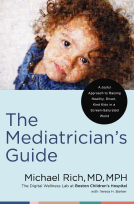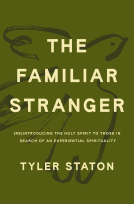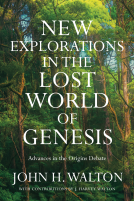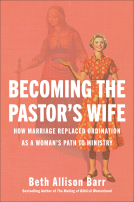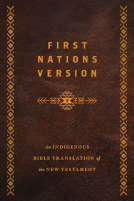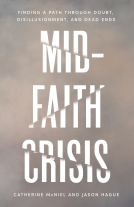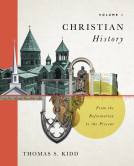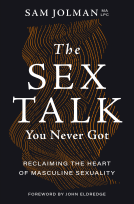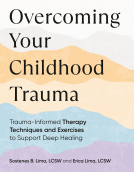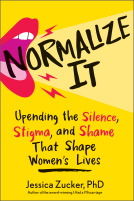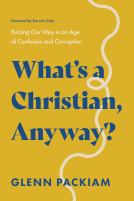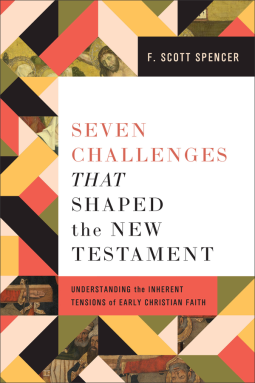
Seven Challenges That Shaped the New Testament
Understanding the Inherent Tensions of Early Christian Faith
by F. Scott Spencer
This title was previously available on NetGalley and is now archived.
Send NetGalley books directly to your Kindle or Kindle app
1
To read on a Kindle or Kindle app, please add kindle@netgalley.com as an approved email address to receive files in your Amazon account. Click here for step-by-step instructions.
2
Also find your Kindle email address within your Amazon account, and enter it here.
Pub Date Jul 30 2024 | Archive Date Aug 13 2024
Baker Academic & Brazos Press | Baker Academic
Talking about this book? Use #SevenChallengesThatShapedtheNewTestament #NetGalley. More hashtag tips!
Description
This lively investigation explores the challenges that influenced the New Testament writings and how the writers responded to those tensions. The author shows that out of this upheaval came a remarkable set of creative, dynamic writings that have shaped and challenged millions of lives as sacred Scripture.
This accessibly written book offers a fresh way to learn about the world and content of the New Testament writings. It will help readers appreciate the rich diversity of New Testament thought cohering around commitment to the one Lord and Savior, Jesus Christ.
Advance Praise
“Studying the New Testament can feel like an excursion in a strange land. F. Scott Spencer provides an accessible and clarifying guide to the ideas that shaped and were reshaped by the New Testament. Most helpfully, these ideas are not simple binaries but complex tensions befitting the difficult and vital work the earliest followers of Jesus took up. This book is an ideal companion for those students seeking to understand anew both the historical significance and the contemporary significance of these important texts.”—Eric D. Barreto, Weyerhaeuser Associate Professor of New Testament, Princeton Theological Seminary
“My students, especially students who are part of faith communities, tend to struggle with the humanness of the New Testament books. Spencer’s Seven Challenges offers these students an invitation to grapple with the historical and cultural situatedness of the New Testament, understand why different books give different perspectives on key questions, and appreciate the New Testament as a record of the experiences of first-century Christians. This book will be an excellent resource for anyone who has wondered how to read the New Testament in its ancient context and how to hear its messages in our modern context.”—Caryn A. Reeder, professor of New Testament, Westmont College
“With engaging and accessible style, Spencer provides an excellent introduction to seven interrelated challenges that have confronted Christians over the centuries. Through bringing New Testament texts into conversation with each other and with an eye to the cognitive and emotional upheaval early Christians likely experienced, Spencer provides an honest account of tensions within Christianity. This book does not seek to resolve these tensions but allows early Christian faith, love, and hope to speak into them.”—Katherine M. Hockey, lecturer in New Testament, University of Aberdeen
“A creative and enlightening strategy for explaining some key trajectories in biblical thought. By treating the New Testament books as works-in-progress, Spencer explores how different authors deal with the ‘big ideas’ that engaged many people at the time. These authors do so in diverse and potentially contradictory ways that, Spencer demonstrates, contribute to the richness of Christian thought. This is a book that illuminates important aspects of what the New Testament authors wanted to convey while at the same time expanding our appreciation for the relevance of scriptural witness.”—Mark Allan Powell, professor of New Testament, Trinity Lutheran Seminary (retired)
“Various dimensions of New Testament faith in Jesus as Messiah, Lord, and Savior are in creative tension—such as the tension between the new and the old, between the cross as victory and as humiliation, between wholeness in Christ and ongoing suffering, and between the hope of Jesus’s imminent return and the reality of the delay of the parousia. In this wonderfully readable book, Scott Spencer shows how the New Testament is shaped by and responds to seven creative and productive tensions. In the process, he expertly illuminates the big ideas of New Testament faith. Highly recommended!”—Paul Trebilco, professor of New Testament studies, University of Otago, Dunedin, New Zealand
“Jesus was a game-changer of cosmic proportions for the earliest believers, but the lines connecting his death and resurrection to their beliefs, behaviors, and forms of belonging were anything but sharp, straight, or self-evident. The New Testament documents their attempts at drawing those lines in real time and in response to unforeseen challenges. Spencer is the consummate eavesdropper on their conversations, providing commentary that enables readers to hear more clearly voices that have been muffled or distorted in the intervening centuries.”—Patrick Gray, professor of religious studies, Rhodes College
“Taking seriously the different genres and the occasional nature of the New Testament writings, Spencer brings the debates of these authors and their communities alive for contemporary readers. With his characteristic engaging style, Spencer takes readers on a journey into the diverse world of the earliest Jesus-followers and helps us see the ways in which their debates, questions, and emotions are not so different from our own.”—Alicia D. Myers, associate professor of New Testament and Greek, Campbell University Divinity School
Available Editions
| EDITION | Other Format |
| ISBN | 9781540966346 |
| PRICE | $27.99 (USD) |
| PAGES | 240 |
Available on NetGalley
Featured Reviews
 Reviewer 1281795
Reviewer 1281795
This was a good examination of the cultural environment and tensions that shaped early Christianity. Thought provoking!
 Yakub T, Educator
Yakub T, Educator
To know "why" behind something will bring us to a new comprehension about that something. Of course, in this case, by proposing seven challenges that shaped New Testament will help us to see the historical and cultural situatedness of the New Testament so we can understand why different books give different perspective on one event. It will enrich our reading of New Testament.
I had a hard time following the arguments made in this book. A lot of questions were raised without answers given. I wanted to know more about how the biblical authors addressed and answered the challenges. I also thought more credibility would be added by using extra biblical sources.
 Andrew P, Reviewer
Andrew P, Reviewer
"Seven Challenges That Shaped the New Testament" by F. Scott Spencer provides a comprehensive examination of the conflicts and dilemmas that influenced the early Christian community and its writings. Spencer expertly navigates through a series of challenges—intellectual, moral, political, and more—to reveal how they critically shaped the formation of the New Testament. He posits, "Each challenge brings to light the vibrant and often contentious processes that forged these sacred texts.
Chapter 1: Old and New
In this chapter, Spencer explores the tension between maintaining Jewish traditions and embracing the new teachings introduced by Jesus. He notes, "The early Christians navigated the delicate balance between 'tradition' and 'transformation,'" highlighting the struggle to integrate Jesus's radical teachings with established Jewish law. This challenge is further elucidated with, "The friction between old and new not only tested faith but also tempered it, crafting a distinct identity for what would become Christianity."
Chapter 2: Right and Wrong
Spencer delves into the ethical and moral debates that roiled early Christian communities, focusing on how they wrestled with defining righteous behavior. He explains, "Moral dilemmas were not merely theoretical but were lived experiences that demanded practical responses," and adds, "The delineation between right and wrong became a crucible for doctrinal development, shaping the ethical landscape of the New Testament."
Chapter 3: Weak and Strong
This chapter addresses the political dynamics within the early church, particularly the issues of authority and power. Spencer asserts, "The challenge of navigating authority and tyranny was both an internal and external struggle for early Christians," and he illustrates how this struggle influenced ecclesiastical structures and teachings with, "Questions of power permeated not just the governance of the community but also its theological expressions."
Chapter 4: Weal and Woe
Here, Spencer examines how economic hardships and physical suffering influenced Christian doctrine. He points out, "The material realities of poverty and illness were ever-present, forcing the church to respond not only with theology but with tangible aid," and clarifies, "This dual response to material challenges underscored the inseparability of faith and works in the Christian life."
Chapter 5: One and All
In discussing social inclusivity and exclusivity, Spencer highlights the divisions within the early church. He remarks, "The struggle to define who belonged to the community of believers often led to sharp disputes," and observes, "These conflicts, while painful, were instrumental in defining the boundaries and beliefs of early Christianity."
Chapter 6: Seen and Secret
Spencer tackles the intellectual challenges faced by early Christians, particularly in terms of understanding and interpreting spiritual truths. He notes, "The tension between what was 'seen' and what remained 'secret' drove the theological quest for knowledge," and discusses the impact of this on Christian teachings with, "This challenge shaped not only the esoteric strands of Christian thought but also its more mainstream doctrines."
Chapter 7: Now and Near
The final chapter focuses on the eschatological expectations of early Christians. Spencer reflects, "The anticipated imminence of Christ's return was a powerful motivator in early Christian behavior and belief," and he adds, "The delay of the Parousia forced a recalibration of eschatological expectations, deeply affecting theological development and daily living."
Conclusion
In "Seven Challenges That Shaped the New Testament," F. Scott Spencer masterfully demonstrates how the early Christian community's response to various challenges deeply influenced the development of New Testament writings. Through meticulous analysis and engaging narrative, Spencer provides readers with a rich understanding of how historical, social, and theological pressures shaped the foundational texts of Christianity. This book is an essential read for anyone interested in the formative years of the Christian faith and the enduring impact of its foundational challenges.
Recommended Audience
This book is invaluable for theologians, biblical scholars, and students of religious studies, offering deep insights into the complex factors that influenced the early Christian community. It is also highly recommended for lay readers interested in the historical contexts that shaped the New Testament, providing a clearer understanding of its teachings and relevance.
This was an interesting look at how tensions between the “basic tenets and apparent countervailing realities” help to determine the evolution of Christian doctrine. I was especially interesting in this topic since I have frequently been exposed to the idea that interpreting the Jewish Torah often requires a both/and approach where western thought more frequently sees an either/or interpretation. While related, this work does not use the same framework; rather, it focuses on the struggle to adapt the former to the latter in a way that more or less represents a compromise position rather than a contextual continuum. In that respect, it was a bit of a disappointment while still providing a solid understanding of context when much of the doctrine of the Church was determined … and so is very helpful in approaching and understanding the Christian New Testament.
As indicated by the title, the focus is on seven (7) areas of theological tension: the apparent differences between the “old testament” of the Jews and the “new testament” of a more Gentile community; the differences in determining what was righteous and what was not for each community (eg circumcision requirements and kosher laws) and the apparent dissonance of finding they still had to deal with a fallen world even while anticipating the paradise of God’s Kingdom (changing expectations) … that last being the principle concern of the book (for five of the seven chapters) … dealing with difficult questions such as why do we still die if Christ has “conquered” death … or why has Christ not returned yet … or while does evil and division still exist in the world. Chapter six takes a side trip into the gnostic heresy and its appeal that was interesting from the aspect of how the Church responded to this perennial threat to orthodoxy. Over all it was a solid addition for anyone interested in Christian religious study.
The chapters and sections in this work are …
Prologue: Creative Tension of Mind and Heart
1. Old and New: The Historical Challenge of Innovation and Evolution
2. Right and Wrong: The Moral Challenge of Hypocrisy and Apostasy
3. Weak and Strong: The Political Challenge of Authority and Tyranny
4. Weal and Woe: The Material Challenge of Infirmity and Poverty
5. One and All: The Social Challenge of Particularity and Partisanship
6. Seen and Secret: The Perceptual Challenge of Skepticism and Gnosticism
7. Now and Near: The Temporal Challenge of Delay and Deferment
Readers who liked this book also liked:
Terry M. Wildman
Christian, OwnVoices, Religion & Spirituality
Sostenes B. Lima, LCSW; Erica Lima, LCSW
Health, Mind & Body, Self-Help
